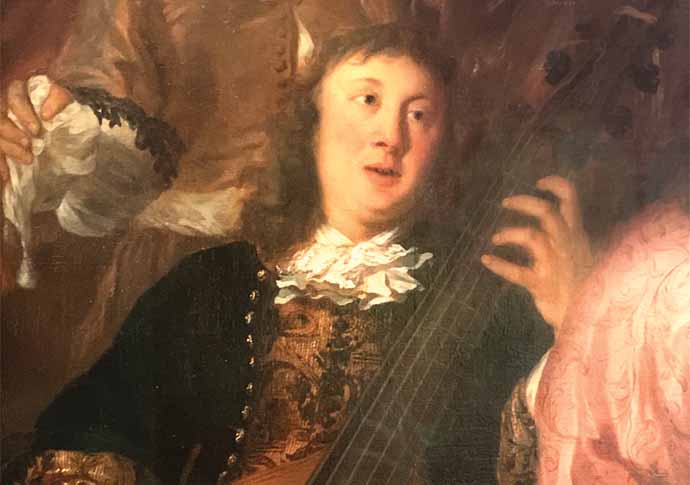Michael White’s classical news: Rake’s Progress; The Glory of Lübeck; Allan Clayton; Stabat Mater
Thursday, 29th February — By Michael White

Danish composer Dieterich Buxtehude (c1637-1707) portrayed in a painting ‘The Musical Party’, 1674, by Johannes Voorhout [Alexander M. Winkler_CC BY-SA 4.0]
THAT the apparatchiks at Arts Council England don’t care for opera is fairly obvious, not only from the hatchet job they’ve done on English National Opera but from the way they’ve decimated touring opera in this country. Thanks to swingeing cuts, not many companies are out there on the road now, taking the great works of lyric theatre far and wide.
But one that thankfully remains is English Touring Opera, which habitually opens its shows at Hackney Empire before hauling them off to places like Poole, Truro, Durham and Sheffield. And although the Manon Lescaut that played there last week was a dog’s dinner of a production, turning Puccini’s tragic love story into slapstick farce, the music was impressively delivered. So I’m hoping for good things when ETO’s new Rake’s Progress opens at the Empire this Saturday, March 2.
Composed by Stravinsky in the 1950s, Rake’s Progress is a tale of social rise and fall in 18th-century London, set to music that’s a sort of 18th-century pastiche – but, being Stravinsky, with edge. It plays in English, with a libretto by WH Auden that has to be one of the sharpest, smartest ever written. And though some ears find it all emotionally cold, the final scene – where the hero loses his mind and ends up in Bedlam – has the most achingly beautiful music Stravinsky ever produced. In Hackney for one night only. englishtouringopera.org.uk
• When I saw the Hampstead Collective were giving a concert called The Glory of Lübeck, I hoped it might be about the chocolate-covered marzipan they sell in the north German city’s awe-inspiring sweet shops. But no: it’s Dieterich Buxtehude, the composer/ organist who presided over Lübeck’s musical life in the 17th century and is famous for offering JS Bach a job on condition that he marry Buxtehude’s daughter (she was unattractive, Bach declined). Beyond abortive efforts as a marriage-broker, Buxtehude wrote prolifically. And on March 4, at Hampstead Parish Church, you can hear selections of his vocal concertos and instrumental sonatas – maybe with some marzipan thrown in, though no one’s promising. thehampsteadcollective.com
• One of the great English voices of today is tenor Allan Clayton, who looks like an Old Testament prophet but sings like an angel. And he’s doing a bit of both at the Royal Festival Hall, March 2, as a soloist in Haydn’s oratorio The Creation – with the London Philharmonic Orchestra under Edward Gardner. southbankcentre.co.uk
• Another big choral work playing March 2 is Poulenc’s ravishing if blowsy Stabat Mater, which depicts the agony of Mary at the foot of the Cross in sweeping, almost cinematic terms. Paired with Bizet’s Te Deum, it’s done by Highgate Choral Society amid the magnificent grandeur of All Hallows Church, Gospel Oak. hcschoir.com
• It’s nearly 40 years since John Adams made his name with one of the most celebrated of modern operas, Nixon in China; and it’s good to see him still actively composing, with a new work that premieres at the Barbican, March 3, as part of an all-American programme from the LSO. Gershwin’s Piano Concerto and Roy Harris’s 3rd Symphony feature alongside. Simon Rattle (who has officially retired as the orchestra’s music director but can’t seem to keep away) conducts. barbican.org.uk